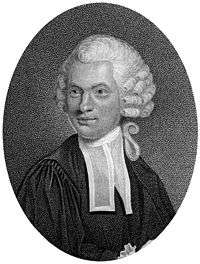Capel Lofft

Capel or Capell Lofft (14 November 1751 – 26 May 1824) was an English lawyer, minor political figure and miscellaneous writer. He also had an interest in astronomy. He is noted as observing the solar transits of Mercury on 7 May 1799 and 9 November 1802,[1][2] the solar eclipses on 16 June 1806 and 19 November 1816,[3][4] as well as the lunar eclipses on 4 December 1797 and 10 June 1816.[5][6]
Life
Born in London, he was educated at Eton College, and Peterhouse, Cambridge,[7] which he left to become a member of Lincoln's Inn. He was called to the bar in 1775, and the deaths of his father and uncle in 1811 left him with a handsome property and the family estates. A Foxite Whig, he was a prolific writer on the law and political topics, a vigorous and contentious advocate of parliamentary and other reforms, and carried on a voluminous correspondence with all the literary men of his time. A strong supporter of Napoleon, he wrote numerous letters to the press (Morning Chronicle 31 July and 10 August 1815) opposing the Government's decision to send Napoleon to St Helena and himself attempted to serve a writ of habeas corpus while Napoleon was held on board a ship in Plymouth.
He had also came to grief earlier in his own county. On the night of 3 October 1799, Sarah Lloyd, a 22 year old servant girl, let her 'abandoned seducer' into her mistresses house, and became apparently 'the instrument in his hand of crimes of robbery and house-burning. She stole 40 shillings and suffered the ultimate penalty-death by hanging. Capel Lofft fought strenuously for a reprieve, but failed, and on the morning of 23 April 1800, she was trundled along in a cart to the place of execution in Bury. It was raining and Capel Lofft, performed the last service he could for her. He walked beside the cart and held his umbrella over her. He stayed by her side right up to the minute of her execution. Authority took a dim view of his fight on her behalf, and he was struck off the Roll.[8]
Lofft wrote the preface to poet and former Quaker Thomas 'Clio' Rickman's An Ode, in Celebration of the Emancipation Of The Blacks of Saint Domingo, November 29, 1803.[9][10] Lofft implicitly commended Toussaint Louverture - "of whom Posterity will know how to speak" - and hoped that "a Nation [Haiti] which has emerged into Freedom should prove itself capable and worthy of the blessings [sic] by its use of it".[9] He became the patron of Robert Bloomfield, the author of The Farmer's Boy, and was responsible for the publication of that work. Byron, in a note to his English Bards and Scotch Reviewers, ridiculed Lofft as "the Maecenas of shoemakers and preface-writer general to distressed versemen; a kind of gratis accoucheur to those who wish to be delivered of rhyme, but do not know how to bring forth."
In 1816 Lofft took his family to Europe for the sake of his daughters' education.[11] In 1824 he died at Montcalieri, near Turin.[12]
Family
He married Anne, daughter of Henry Emlyn, in 1778.[13] Their fourth son Capell Lofft the younger (1806–1873), also a writer, inherited his father's liberal ideas and principles, and carried them in youth to greater extremes. In his old age he abandoned these theories, which had brought him into the company of some of the leading political agitators of the day. He died in America, where he had a Virginia estate.
References
| Wikisource has original works written by or about: Capel Lofft |
- ↑ "The Monthly magazine. v.7 (1799). - Full View | HathiTrust Digital Library | HathiTrust Digital Library". babel.hathitrust.org. Retrieved 2017-07-04.
- ↑ "The Monthly magazine. v.14 (1802). - Full View | HathiTrust Digital Library | HathiTrust Digital Library". babel.hathitrust.org. Retrieved 2017-07-04.
- ↑ "The Monthly magazine. v.22 (1806). - Full View | HathiTrust Digital Library | HathiTrust Digital Library". babel.hathitrust.org. Retrieved 2017-07-04.
- ↑ "The Monthly magazine. v.42 (1816). - Full View | HathiTrust Digital Library | HathiTrust Digital Library". babel.hathitrust.org. Retrieved 2017-07-04.
- ↑ "The monthly magazine, or, British register. c.1 v.4 1797. - Full View | HathiTrust Digital Library | HathiTrust Digital Library". babel.hathitrust.org. Retrieved 2017-11-22.
- ↑ "The monthly magazine, or, British register. c.1 v.42 1816. - Full View | HathiTrust Digital Library | HathiTrust Digital Library". babel.hathitrust.org. Retrieved 2017-11-22.
- ↑ "Lofft, Capell (LFT769C)". A Cambridge Alumni Database. University of Cambridge.
- ↑ "Stanton history" (PDF).
- 1 2 Rickman, Thomas "Clio" (1804). An Ode, in Celebration of the Emancipation Of The Blacks of Saint Domingo, November 29, 1803. London: Thomas "Clio" Rickman. pp. 4, 5.
- ↑ Smith, Charlotte Fell (1896). Dictionary of National Biography. 48. London: Smith, Elder & Co. p. 266.
- ↑ Memoirs of Celebrated Men of the Nineteenth Century. J. Chidley. 1842. p. 165.
- ↑ Memoirs of Celebrated Men of the Nineteenth Century. J. Chidley. 1842.
- ↑ Marsden, Christopher. "Emlyn, Henry". Oxford Dictionary of National Biography (online ed.). Oxford University Press. doi:10.1093/ref:odnb/8791. (Subscription or UK public library membership required.)
